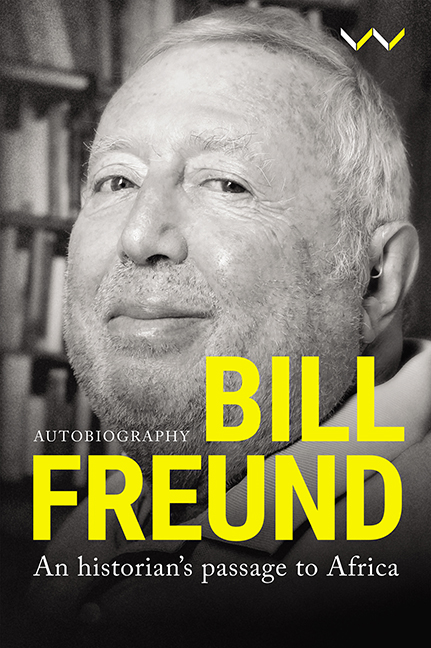Book contents
- Frontmatter
- Contents
- Foreword: Bill Freund and the Making of His Autobiography
- Family Tree
- A Brief Introduction
- 1 The Austrian Past
- 2 The Aftermath of War: A Perilous Modernity
- 3 The Dark Years
- 4 A New Life in America
- 5 Adolescence: First Bridge to a Wider World
- 6 As a Student: Chicago and Yale
- 7 As a Student: Africa and England
- 8 The Tough Years Begin
- 9 An Intellectual and an African: Nigeria
- 10 An Intellectual and an African: Dar es Salaam and Harvard
- 11 South Africa, My Home
- Notes
- Select Bibliography of Bill Freund’s Publications
- List of Illustrations
- Author’s Acknowledgements
- Supplementary Acknowledgements
- Index
Foreword: Bill Freund and the Making of His Autobiography
Published online by Cambridge University Press: 15 June 2021
- Frontmatter
- Contents
- Foreword: Bill Freund and the Making of His Autobiography
- Family Tree
- A Brief Introduction
- 1 The Austrian Past
- 2 The Aftermath of War: A Perilous Modernity
- 3 The Dark Years
- 4 A New Life in America
- 5 Adolescence: First Bridge to a Wider World
- 6 As a Student: Chicago and Yale
- 7 As a Student: Africa and England
- 8 The Tough Years Begin
- 9 An Intellectual and an African: Nigeria
- 10 An Intellectual and an African: Dar es Salaam and Harvard
- 11 South Africa, My Home
- Notes
- Select Bibliography of Bill Freund’s Publications
- List of Illustrations
- Author’s Acknowledgements
- Supplementary Acknowledgements
- Index
Summary
In 1985 Bill Freund arrived in Durban as full professor and head of the Economic History Department at the University of Natal. At this point I was a lecturer in history at the neighbouring University of Durban- Westville, established exclusively for ‘Indians’ in terms of apartheid segregationist policy, and definitely the poor cousin of the much older University of Natal. I had not yet published an academic article or completed a PhD. Bill, by contrast, was already an accomplished academic, with global networks, over ten years of academic experience and two books to his name, one of which, The Making of Contemporary Africa, was described in the Journal of African History as ‘a landmark in African historiography’.
From soon after his arrival Bill became a close friend of mine. He also became my PhD supervisor and, in 1989, once I had joined the University of Natal, Durban, a colleague. It says a lot about Bill, Durban and the times that the personal and professional gulf between us did not prevent a strong and long friendship from developing. Bill was no snob and he welcomed all overtures of friendship. His arrival in Durban also coincided with an increase in levels of anti-apartheid activity, which created a community of like-minded people who knew one another and who welcomed Bill as a long-lost brother. Bill's views on apartheid, capitalism and injustice were well known, and he found himself among people who appreciated his views and were keen to involve him in academic and social life.
Increased repression, culminating in a national State of Emergency in 1986, cast a shadow over these times. The country was in the throes of what some at the time called a low-level civil war, particularly in KwaZulu- Natal. The heat was felt at the University of Natal where certain books could not be taken out of the Library (they were seen as a threat to national security) and forms of activism frequently attracted the attention of the security police. Yet, for all this, Bill began the happiest years of his life. He became part of a group of mostly white, politically progressive men who played a game of touch rugby once a week. He loved the game and the camaraderie, and seldom missed a session. Although he’d never played rugby before and his skills set was limited, the game made him feel manly. No longer on the sidelines and neglected, he was embraced as a team member. I think his happiness enhanced his writing and made him more confident.
- Type
- Chapter
- Information
- Bill FreundAn Historian's Passage to Africa, pp. vii - xiPublisher: Wits University PressPrint publication year: 2021



